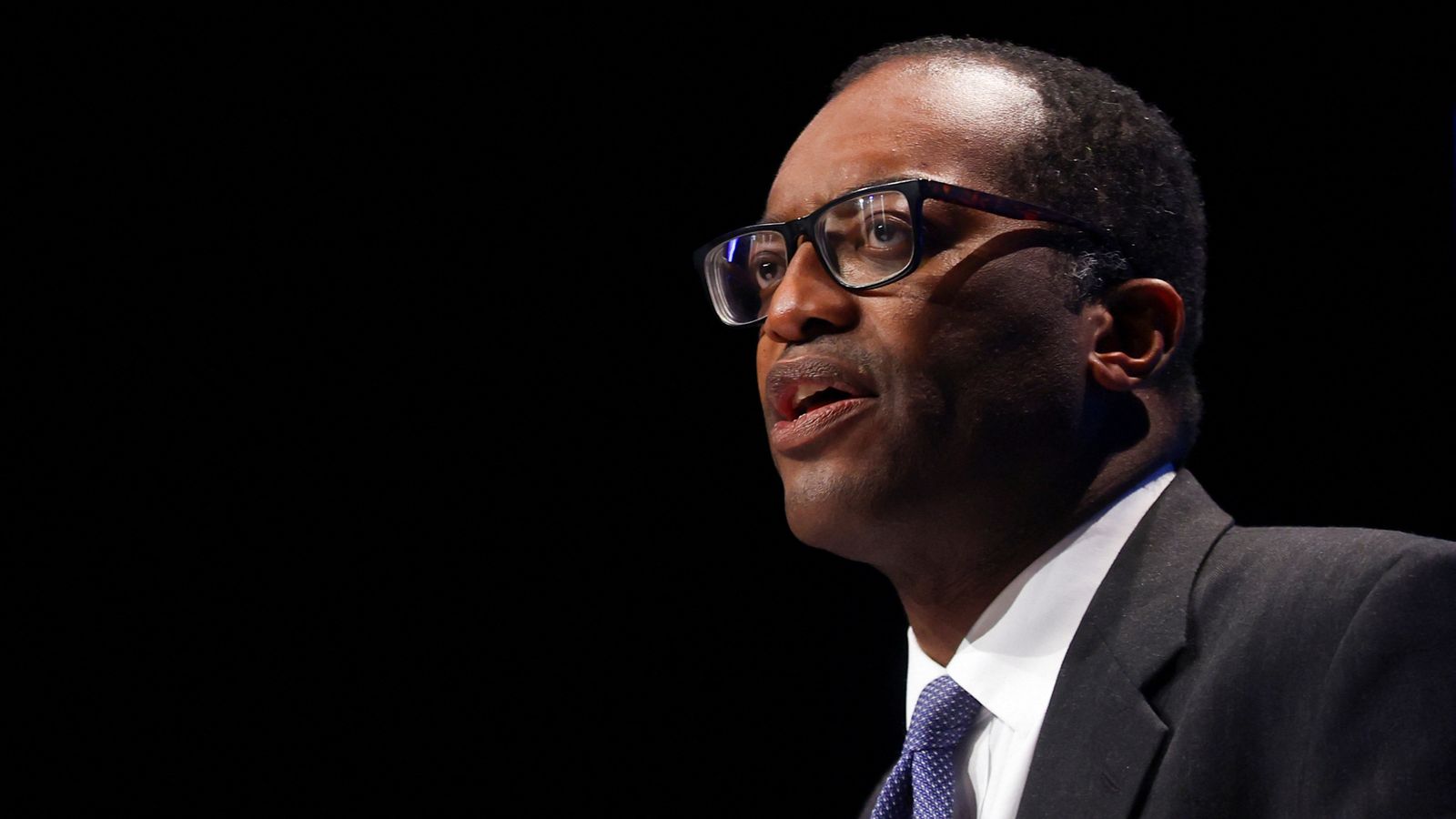The chancellor has insisted he is “not going anywhere” amid the economic turmoil in the UK and said he remains “totally focused” on delivering the government’s growth plan.
During a visit to Washington DC, Kwasi Kwarteng was asked whether he and Liz Truss, the prime minister, will be in their respective roles this time next month.
“Absolutely. 100%. I’m not going anywhere,” he said.
The chancellor admitted there has been some “domestic turbulence” since he unveiled his tax-cutting mini-budget at the end of September and the pound fell to record lows against the dollar, but said there is “a very dicey situation globally”.
Truss is out ‘and we have the numbers’, says Tory MP – politics latest
“I speak to Number 10, the PM all the time, and we are totally focused on delivering the growth plan,” he said.
Pushed on whether there will be any more reversals of policies in the mini-budget, Mr Kwarteng said: “I am totally focused on the growth agenda.”
Kwasi Kwarteng in Washington DC for talks with IMF as Liz Truss faces revolt at home
Mini-budget ‘complicated’ Bank of England’s battle to bring down inflation, says IMF chief economist
Truss and Kwarteng billions short of the sums they need – can they fill hole left by tax cuts? | Sam Coates
Last week, after open revolt from Tory MPs and a surge in support for Labour in the polls, Ms Truss and Mr Kwarteng abandoned the plan to abolish the highest 45% tax rate.
Sky News understands discussions are under way in Downing Street over whether to scrap some of the contentious proposals which remain in the chancellor’s tax-cutting mini-budget.
The proposed changes to corporation tax and dividend tax are those understood to be under discussion.
Downing Street insisted earlier on Thursday that there will be no more U-turns on policies in the government’s tax-cutting mini-budget.
Asked to confirm there would be no further reversals, the prime minister’s official spokesman said: “Yes, as I said to a number of questions on this yesterday – and the position has not changed from what I set out to you all then.”
Ms Truss faces open revolt in her party over the £45bn package of unfunded tax cuts in the mini-budget, which unleashed chaos in the markets when it was announced last month.
Ms Truss and Mr Kwarteng have said the cuts are needed to get the economy growing. Data published on Wednesday suggested the country was heading for recession.
The chancellor will set out his debt-cutting plan in more detail on 31 October, having bowed to pressure to bring the date forward from 23 November given the economic turbulence.
Earlier on Thursday James Cleverly, the foreign secretary, refused to say there would be no more reversals
He told Sky News the Halloween statement would give “a more holistic assessment of the public finances and our response to the global headwinds that every democracy, every economy in the world is facing”.
Pressed on the plan to axe the increase in corporation tax from 19% to 25% in April, Mr Cleverly said it is “absolutely right” the government helps businesses to “stay competitive” and “stay afloat”.
The Treasury had vowed to reduce the rate of income tax on dividends by 1.25 percentage points.
Mr Kwarteng is meeting with International Monetary Fund (IMF) leaders in Washington DC today, after the institution’s chief economist said tax cuts threatened to cause “problems” for the UK economy.
Read more:
What on earth is happening in UK markets?
What are bonds and where do they fit in the mini-budget crisis?
In her first PMQs since the mini-budget last month, Ms Truss yesterday pledged not to cut public spending to balance the books – despite the Institute for Fiscal Studies warning the government would have to cut spending or raise taxes by £62bn if it is to stabilise or reduce the national debt as promised.
On Wednesday, Mel Stride, the Tory chairman of the Commons Treasury Committee, said that given Ms Truss’s commitments to protect public spending, there was a question over whether any plan that did not include “at least some element of further row back” on the tax-slashing package can reassure investors.
While David Davis, the Tory former minister, called the mini-budget a “maxi-shambles” and suggested reversing some of the tax cuts would allow Ms Truss and Mr Kwarteng to avert leadership challenges for a few months.










